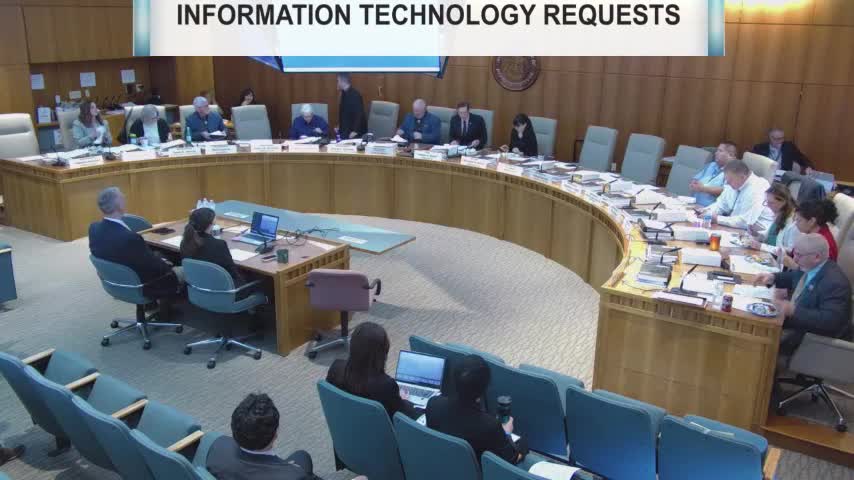House Appropriations & Finance adopts subcommittee "catch up cleanup" package, adds one-time and recurring funding for victims, livestock inspections, and other
Get AI-powered insights, summaries, and transcripts
Subscribe
Summary
The House Appropriations & Finance Committee adopted a subcommittee “catch up cleanup” package that adjusts recurring and one‑time appropriations for multiple state agencies, adding money for a victims reparations priority, livestock meat inspection and several personnel requests while committee members pressed for more follow‑up and asked for a fuller accounting of omitted items.
The House Appropriations & Finance Committee on an informational motion adopted a subcommittee “catch up cleanup” recommendation that adjusts recurring and one-time funding for multiple state agencies, including new personnel money for the Gaming Control Board, recurring increases for the Martin Luther King Jr. Commission, one-time funding for an assault victims reparations priority, and added recurring money for the New Mexico Livestock Board’s meat inspection division.
The package, described by Amanda Breiding, chief of staff to the committee, included both line-by-line adjustments that subcommittees flagged and smaller capacity increases aimed to stay “within our recurring framework.” Breiding said the recommended change to the State Investment Council is “general fund neutral” and would move “1,200,000.0 from the contracts category and moving it into the 2 hundreds category.”
Why it matters: The catch up cleanup is intended to clear items identified during earlier subcommittee work so staff can begin drafting committee reports and agencies can plan for the fiscal year. Members praised additional money for victims services and livestock inspections but several said the list omits items they expected and asked that the committee continue to review open flags.
Top items and dollar notes - State Investment Council: recommendation to shift $1,200,000 from contracts (300s) to personnel (200s); Breiding described this as “general fund neutral.” - Gaming Control Board: added roughly $87,000 in general fund for a senior gaming auditor position; LFC/subcommittee personnel concerns drove the addition. - Martin Luther King Jr. Commission: $101,000 recurring general fund to match a new leadership request. - Minor’s hospital (as presented): restored a $675,000 transfer from “other financing uses” after DFA/LFC/agency discussion concluded the hospital needed that other revenue source. - Scribe Victims Reparation Commission: recommendation keeps recurring LFC money and adds $1,000,000 one-time for assault victims priorities. - Department of Homeland Security and Emergency Management (DHSEM): add $220,000 and three FTE for personnel to support priorities flagged by the subcommittee. - Office of Military-Based Planning: $100,000 in contracts to support intergovernmental work and community capacity building. - Military Affairs Department: committee recommended treating the Governor’s Challenge program as one-time funding with accountability language to measure outcomes instead of adding it to recurring budgets. - New Mexico Livestock Board: add $721,000 recurring for the meat inspection division (the transcript notes a gap close to $3,000,000 between request and executive recommendation; the subcommittee recommended a smaller recurring start).
Committee discussion and member concerns Breiding told the committee the list reflects work by subcommittee chairs and LFC staff to prioritize items that could be adjusted within the committee’s recurring-capacity goals. Representative Dow asked whether the sheet was the “ketchup and cleanup” from subcommittee work; Breiding confirmed it applies to subcommittee reports only. Representative Pettigrew and others urged more time and said the packet omits items members expected; Pettigrew said, “This is, in my opinion, not something that we should even consider a vote on today,” arguing members needed more time to reconcile outstanding requests.
Several members emphasized particular items. Representative Duncan urged committee consideration of the $1,000,000 for assault victims services (“the number of victims in this state is horrendous”), while Representative Vaca and others highlighted support for the livestock board to expand local meat inspection capacity.
Formal action Vice Chair Dixon moved to adopt the proposed subcommittee catch up cleanup; the motion was seconded and the committee recorded two members in opposition (the transcript does not name the nays). The clerk announced, “The subcommittee, catch up cleanup is adopted.”
What the committee directed next Committee staff and LFC were instructed to draft the committee report and continue to work with members and subcommittee chairs. Members repeatedly asked staff to track outstanding flags and to use working groups to dig deeper on large agencies or items not covered in the cleanup sheet.
Ending note Committee leadership described this adoption as a way to front-load work that in prior years was done at the end of the process. Members stressed the need for continued review—particularly for recurring appropriations—and asked staff to keep lines of communication open as the committee moves into work groups and full budget drafting.
